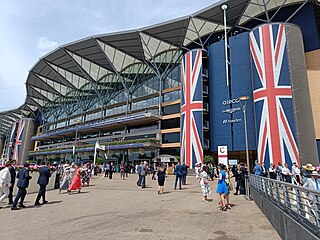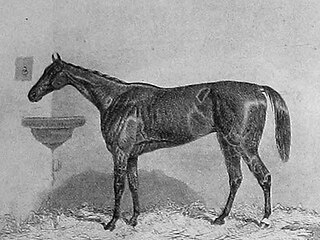
Horse racing is the second largest spectator sport in Great Britain, and one of the longest established, with a history dating back many centuries. According to a report by the British Horseracing Authority it generates £3.39 billion total direct and indirect expenditure in the British economy, of which £1.05 Billion is from core racing industry expenditure and the major horse racing events such as Royal Ascot and Cheltenham Festival are important dates in the British and international sporting and society calendar.

Ascot Racecourse is a dual-purpose British racecourse, located in Ascot, Berkshire, England, about 25 miles west of London. Ascot is used for thoroughbred horse racing, and it hosts 13 of Britain's 36 annual Flat Group 1 horse races and three Grade 1 Jumps races.

Newmarket Racecourse is a British Thoroughbred horse racing venue in Newmarket, Suffolk, comprising two individual racecourses: the Rowley Mile and the July Course. Newmarket is often referred to as the headquarters of British horseracing and is home to the largest cluster of training yards in the country and many key horse racing organisations, including Tattersalls, the National Horseracing Museum and the National Stud. Newmarket hosts two of the country's five Classic Races – the 1,000 Guineas and 2,000 Guineas, and numerous other Group races. In total, it hosts 9 of British racing's 36 annual Group 1 races.

ITV Racing is a programme produced by ITV Sport for races shown on ITV1 or ITV4 in the United Kingdom. The programme is referred to as Racing on STV in Northern and Central Scotland on STV. In its previous incarnation, the show was an essential part of World of Sport.
Channel 4 Racing is the name given to the horse racing coverage on the British television stations Channel 4 and More4.
Peter Bromley was BBC Radio's voice of horse racing for 40 years, and one of the most famous and recognised sports broadcasters in the United Kingdom.
Jim Aloysius McGrath was the BBC's senior horse racing commentator from 1997 to 2012, when the corporation lost the television rights to all horse racing in Great Britain to Channel 4.
Walter Raleigh Willock Gilbert, known as Raleigh Gilbert was a British horse racing commentator active for 40 years.
Ian Bartlett is a horse racing commentator and occasionally was an analyst for the BBC. He has also commentated for Channel 4 Racing.

Tristan (1878–1897) was a British Thoroughbred racehorse and sire. In a career that lasted from the April 1880 to October 1884, he ran 51 times and won 27 races. A useful performer at two and three years old, he matured into an outstanding horse in his last three seasons, winning important races at distances ranging from six furlongs to two and a half miles and defeating three winners of The Derby. Unusually for a 19th-century racehorse, he was regularly campaigned internationally, winning three consecutive runnings of the Grand Prix de Deauville. Tristan's success was achieved despite a dangerous and unpredictable temperament: at the height of his success, he was described as "a very vile-tempered animal".

Virago (1851–1869) was a British Thoroughbred racehorse and broodmare. In a career which lasted from November 1853 to July 1855 she ran sixteen times and won eleven races. All but one of her victories came as a three-year-old in 1854, a year in which she dominated British racing, winning major events at distances ranging from one mile to three miles. Her wins included the classic 1000 Guineas at Newmarket, the Nassau Stakes and the Yorkshire Oaks against her own age and sex. More notable were her successes in open competition, including the Goodwood and Doncaster Cups and three of the season's most valuable handicap races. She was regarded by many British experts as one of the greatest racehorses of the 19th century.

Rockfel was a British Thoroughbred racehorse and broodmare, best known for winning two Classics in 1938. In a career which lasted from July 1937 until May 1939 she ran thirteen times and won eight races. Rockfel began her career at the lowest level, being beaten in a selling race, but improved to become recognised as one of the best British racemares of the 20th century. In 1938 she was the dominant three-year-old in England, winning the 1000 Guineas over one mile at Newmarket and the Oaks over one and a half miles at Epsom. In the autumn she defeated colts in the Champion Stakes and the Aintree Derby and was retired after winning her only race as a four-year-old. She produced one foal before dying in November 1941.
Sun Stream was a British Thoroughbred racehorse and broodmare, best known for winning two Classics in 1945. The filly won five times from seven races in a track career which lasted from spring 1944 until June 1945. As a two-year-old in 1944 she won three races including the Queen Mary Stakes. After being beaten on her three-year-old debut she won the 1000 Guineas over one mile at Newmarket and a substitute Oaks over one and a half miles at the same course a month later. After her second classic win she was retired to stud, where her record as a broodmare was disappointing.

Cherry Lass (1902–1914), was a British Thoroughbred racehorse and broodmare who won two British Classic Races in 1905. In a racing career which lasted from summer 1904 until October 1905 she ran fifteen times and won nine races. As a three-year-old she won the 1000 Guineas over one mile at Newmarket and The Oaks over one and a half miles at Epsom Downs Racecourse a month later. She went on to win the St. James's Palace Stakes at Royal Ascot and the Nassau Stakes at Goodwood before finishing third when favourite for the St Leger Stakes. She was then retired to stud where she showed some promise as a broodmare before her death in 1914.

Charlotte West was a British Thoroughbred racehorse and broodmare who won the seventeenth running of the classic 1000 Guineas at Newmarket Racecourse in 1830. In a racing career which lasted from April 1830 until May 1831 the filly ran seven times and won four races. After winning the 1000 Guineas on her second racecourse appearance, Charlotte West was beaten when favourite for the Oaks Stakes but returned to win races at Ascot and Newmarket before the end of the year. She failed to reproduce her best form in 1831 and was retired from racing.
Zoe (1825–1842) was a British Thoroughbred racehorse and broodmare who won the classic 1000 Guineas at Newmarket Racecourse in 1828. As a two-year-old Zoe won three of her four races and was sold twice after being successful in claiming races. In the following spring the filly won the 1000 Guineas but was unplaced when favourite for the Oaks Stakes, and was retired from racing after two defeats at Ascot Racecourse. Contemporary sources usually printed the horse's name as Zoè.
Maid of Orleans (1806–1825) was a British Thoroughbred racehorse and broodmare who won the classic Oaks Stakes at Epsom Downs Racecourse in 1809. Unraced as a two-year-old, Maid of Orleans won her first race at Newmarket in April 1809 and then won the Oaks as a 16/1 outsider, beating her more fancied stable companion. The filly won only one of her remaining seven races, and was retired from racing at the end of 1810.
Cinna was a British Thoroughbred racehorse and broodmare. She showed great promise as a juvenile in 1919 when she won a very competitive maiden race on her debut before finishing second in the New Stakes and the Bretby Stakes. As a three-year-old she won the 1000 Guineas and the Coronation Stakes and was narrowly beaten when favourite for the Epsom Oaks. She was retired from racing at the end of the year and went on to be a very successful broodmare. Three of her sons became leading sires in Australasia whilst several of her daughters became influential broodmares including the female-line ancestors of Sunday Silence and Indian Ridge.

Canterbury Pilgrim (1893–1917) was a British Thoroughbred racehorse and broodmare. She showed some ability as a juvenile but failed to win a race. She won the Oaks Stakes on her first run as a three-year-old and went on to win the Liverpool Summer Cup, Park Hill Stakes and Jockey Club Cup before being retired at the end of the year. As a broodmare the best of her offspring was Swynford, a top-class racehorse who was even better as a breeding stallion. She also produced the influential sire Chaucer and several good broodmares. She has been described as "one of the most influential horses, stallion or mare, of the Twentieth Century".
This is a timeline of the history of horse racing on television in the UK.









